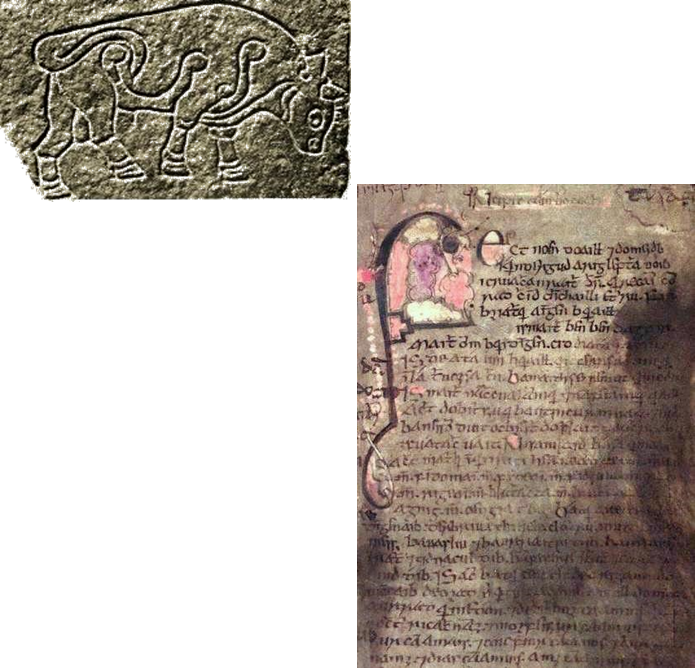Робочий аркуш (a worksheet): Celtic saga
A CELTIC SAGA: RAIDING OF THE CATTLE OF COOLEY
The War O ver the Brown Bull Begins
One da y Ailill and Medb, King and Queen of Connaught began to count up their possessions. Although they were equal in every other thing, in jewels and clothes, in sheep and hourses and swine and cattle, no bull of Medb’s was equal to Ailill’s White -Horned Bull. Only the Brown Bull of Ulster was as good as the White-Horned Bull. And refusing to be less in anything than her husband the proud queen decided to take the Brown Bull be force.
 Medb gathered the armies of all the rest of Ireland to go against Ulster. She expected to have an easy victory, for the warriors of Ulster were at that time lying under a magic weakness which fell upon them for many days each year, as a result of a curse laid upon them, long before, by a goodness who had been insulted by one Conchobar’s ancestors. Medb called up a prophetess of her people to foretell victory. “How do you see our host?” asked the queen of the prophetess. “I see crimson on them; I see red,” she replied. “But the warriors of the Uls ter are lying in their sickness. Now, how do you see our men?” “I see them all
Medb gathered the armies of all the rest of Ireland to go against Ulster. She expected to have an easy victory, for the warriors of Ulster were at that time lying under a magic weakness which fell upon them for many days each year, as a result of a curse laid upon them, long before, by a goodness who had been insulted by one Conchobar’s ancestors. Medb called up a prophetess of her people to foretell victory. “How do you see our host?” asked the queen of the prophetess. “I see crimson on them; I see red,” she replied. “But the warriors of the Uls ter are lying in their sickness. Now, how do you see our men?” “I see them all
![]()
crimson. I see them all red,” she repeated. And then she added to the astonished queen, who had expected a quite different prophecy: “For I s ee a small man doing deeds of arms, though there are many wounds on his smooth skin; the hero light shines round his head, and there is victory on his forehead; he is young and beautiful and modest, but he is a dragon in a battle. I know that all our army will be reddened by him. He is the only man in Ulster who is not
under the magic weakness and he is setting out for battle .”
ABOUT THE STORY
Raiding of the Cattle of Cooley is the central epic of the Ulster cycle. Queen Medb of Connaught gathers an army in order to gain possession of the most famous bull in Ireland, which is the property of Daire, a chieftain of Ulster. Because the men of Ulster are afflicted by a debilitating curse, the seventeen-year-old Cuchulainn must defend Ulster single-handedly. The battle between Cuchulainn and his friend Ferdiad is one of the most famous passages in early Irish literature.
Cuchulainn Defends Ulster Against the Forces of Medb
Man after man came against Cuchulainn, and not one went back. In the intervals between these duels, Cuchulainn harassed the army with his sling, slaying a hundred men a day.
The fighting was so continuous that Cuchulainn got no sleep, except just for a while, from time to time, when he coul d rest a little with his head on his hand and his hand on his spear and his spear on his knee. He did not leave his place for a single night. The gods were watching the hero. His exploits kindled love in the fierce heart of the great war-godness and she gave him her help in his battles.
The great queen determined to see with her own eyes this marvelous hero who was putting all her warriors in fear. She sent a messenger asking him to come and parley with her. Cuchulainn agreed and, at the meeting, Medb was amazed at his boyish look. She found it hard to believe that it was this boy of seventeen who was killing her champions. She offered him her own friendship and great honours and possessions in Connaught if he left Co nchobar. He refused; but she offered it again and again. At last Cuchulainn indignantly declared that the next man who came with such a message would risk his head. He said he was willing to fight one man of Medb’s army every day, and, while the duel lasted the main army might march on, but as soon as he had killed the man, it had to halt until the next day. Medb agreed to this, thinking it better to lose one man a day than a hundred.
|
|
|
|
|
|


про публікацію авторської розробки
Додати розробку

